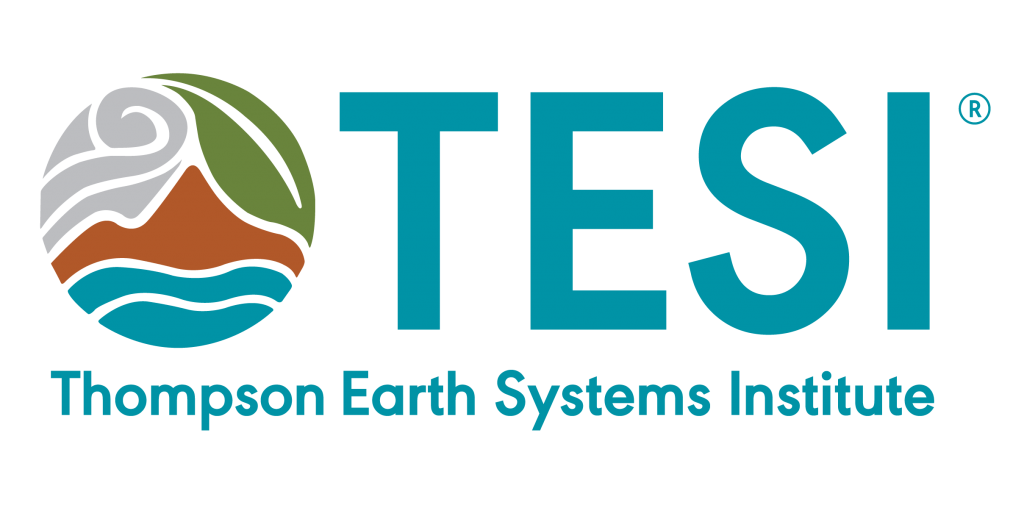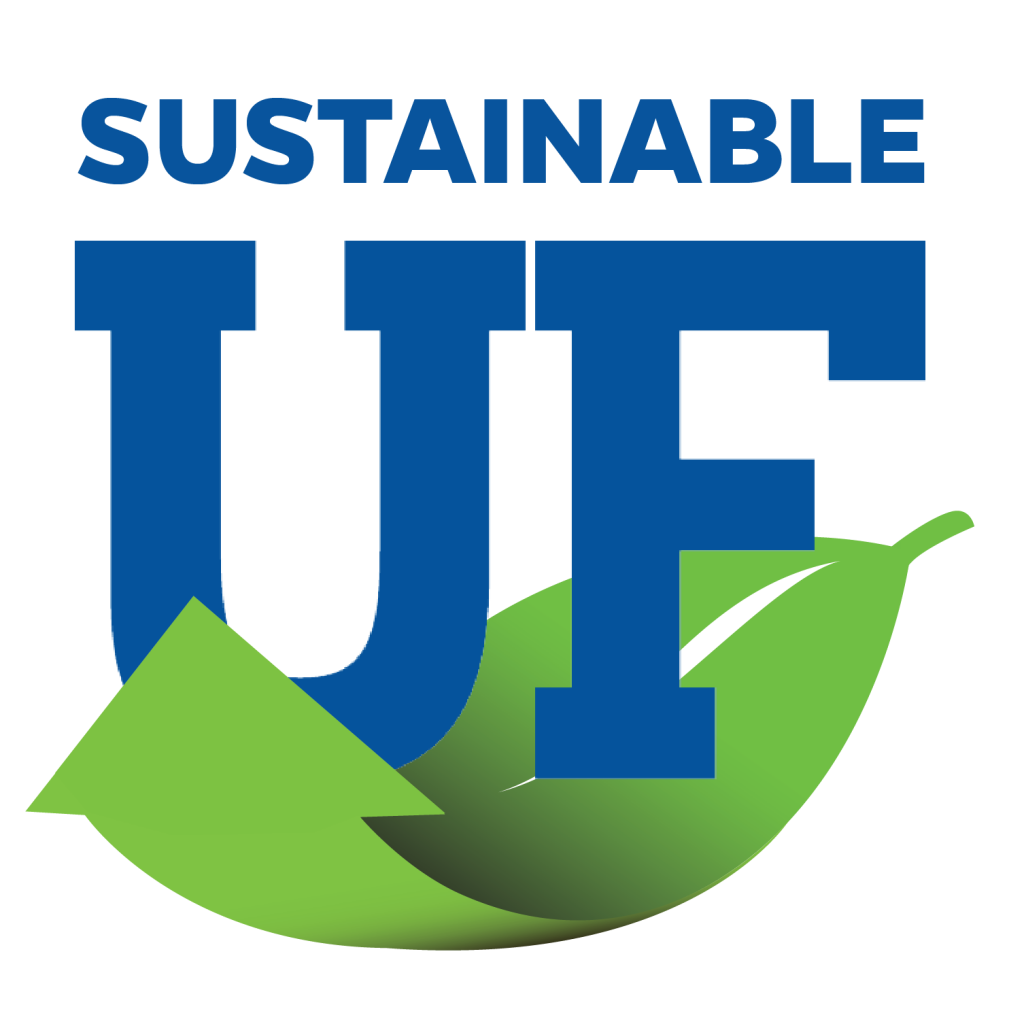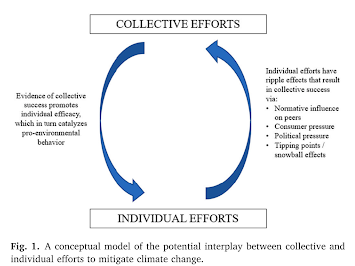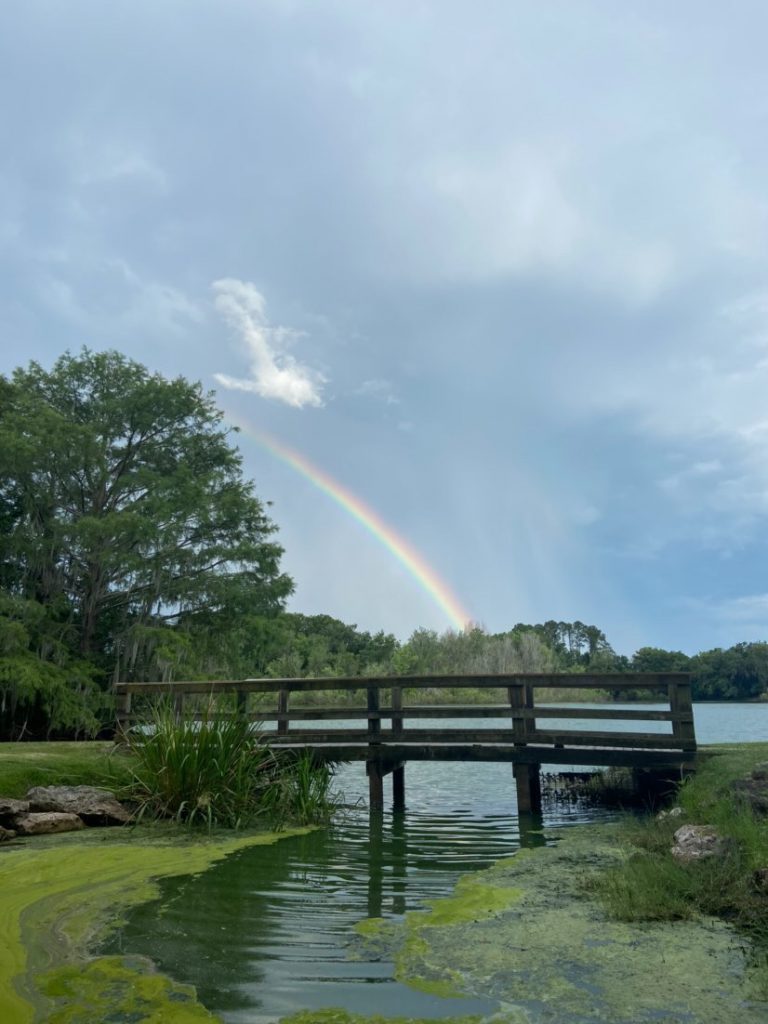

May 2022
Written by Chloe Dill, Office of Sustainability Intern and Second-Year Psychology Major, in collaboration with the UF Thompson Earth Systems Institute.
People who are concerned about climate change, environmental degradation, and other sustainability challenges may be experiencing what is called eco-anxiety. This can include emotions of grief and guilt and the sensation of hopelessness that create a complex feeling, though it differs from person to person. As researchers from The Journal of Climate Change and Health explain, eco-anxiety is difficult to define and has been described as chronic fear and even despair. One way to consider eco-anxiety is as the “mental distress or anxiety associated with worsening environmental conditions.” This means our response to threats may manifest as eco-anxiety, out of concern for the environment, our actions, and our future.
This fear indicates that you care about the planet, which is a good thing! But it can be taxing on our mental health. As agents of change in our society, how can we take action to help our own well-being and the environment?
To answer this question, we can draw on theories from psychology to let us understand helpful perspectives. These new points of view can help us address our anxiety directly, work collaboratively, and believe in our capacity for positive change and meaningful action. This might be as simple as learning how to get involved and make an impact when we have feelings of powerlessness.
For the May Action of the Month, identify, cope with, and use eco-anxiety by learning how we can reframe it. We will explore a few tools to mitigate anxiety and promote meaningful action at the same time.
Understanding and Reframing Eco-Anxiety
First, let’s think about the complex emotional components of eco-anxiety. Eco-anxiety can be triggered by a variety of emotions such as fear, grief, or panic. In an insightful podcast on climate anxiety, LaUra Schmidt, the co-founder of the non-profit Good Grief Network, discusses the importance of coping with eco-anxiety.

Schmidt notes that it is normal, and even expected, to experience an emotional response to climate crises or environmental catastrophes. To further understand this idea, we can look to terror management theory, which suggests that the uniquely human ability to recognize our own mortality can result in deeply rooted fear-based responses. But that is certainly not our only option.
One possible alternative is to consider what UF professor Dr. Ron Chandler has coined Green Courage — or engaging in pro-environmental behavior in spite of fear, rather than in response to it (Psychology of Sustainability, 2012). This is also discussed by Dr. Panu Pihkala who explains that eco-anxiety can be reframed as practical, where “…troubling uncertainty leads people to gather more information and re-evaluate their actions.” This means we have the opportunity to accept our dependence on the environment and use this as emotional motivation to protect it, rather than exploit it.
In the spirit of wellness, avoid ignoring any personal experiences you might have of eco-anxiety. Instead, try actively practicing these mindset shifts. It is important that we recognize the power of reframing our perspectives. In this way, fear can be transformed from a futile feeling to a force for progress.
The Ripple Effect: Collaboration and Motivation
Thomas J. Doherty, PsyD, explains that eco-anxiety is a twofold phenomenon. Eco-anxiety is both a “sociological cultural-wide reckoning” and Doherty notes there’s also a clinical component where stressors or even disorders become relevant. This means that eco-anxiety affects us at the individual and community level, and we should address it accordingly.
Some people may feel that their efforts will not be meaningful or influential in the face of a huge challenge like climate change. By turning to collaborative impact, or what is sometimes referred to as the “ripple effect,” we can help shift our mindset from potential feelings of hopelessness to meaningful, measurable change. Considering the dramatic impact that can be generated from the individual efforts of thousands or even millions of people, what feels like a small drop in the bucket could actually amass into an ocean wave of change.

Building on this idea, another group of researchers proposed a visual model to explain the reciprocal effects between the individual and collective efforts of pro-environmental behavior. In other words, they believe that the collective impact influences individual behavior and vice-versa. (M.J. Hornsey et al.) This model shows how one person’s action could become magnified over time, empowering pro-environmentalism at the individual level. This means that individuals or small groups have the power to make real change in the interest of a more sustainable future. We can influence our peers and coworkers but also drive tangible social movements or alter the priorities of big businesses.
This type of collaborative impact can be seen across various efforts, like the cumulative power of consumer influence. An example of this would be “voting with your dollars” to encourage sustainable practices. As a consumer, you have power to create a higher demand for ethical sustainable production, to which companies have the opportunity to respond accordingly and encourage larger market shifts. To learn more, review Ethical Consumerism 101 and our own blog piece on how to Spot Greenwashing As An Conscious Consumer.
Eco-anxiety may make us doubt our attempts at protecting the environment and conserving resources, even making us feel alone in our efforts. However, surveys like the one hosted by the University of Oxford with over one million respondents have found that “Over all 50 countries, 64% of people said that climate change was an emergency – presenting a clear and convincing call for decision-makers to step up on ambition.” These statistics and models serve to remind us that there is a powerful sense of community here and we should feel encouraged to engage in pro-environmental behaviors knowing so many others share similar sentiments. With this information, we can move forward with confidence without fearing that our efforts are futile. Working together is more than a nice gesture, it’s an effective tool to help us progress and encourage ourselves to persevere.
Self-Efficacy: The Science of Hope

In psychology, self-efficacy is simply the belief that you CAN do something. It has been scientifically proven to be effective in improving performance in many settings like work, school, etc. If self-efficacy can serve as such a useful mindset, as these sources suggest, why not apply this to our sustainability efforts as agents of change?
“It is not just people’s abilities that affect their performance in life, but also their perception of their abilities—their belief that addressing an issue is within their individual and collective capabilities.” ( Heald, 2017).
Using this logic, believing that we can address the climate crisis might actually strengthen our ability to come up with solutions or improve the way that we implement changes. This means going out of your way to celebrate new innovations, policy wins, and progress indicators. Sharing successes in your community can revitalize a movement or initiate a new ripple effect of its own. Practicing being mindful of the efforts we have already made and the potential for the future can encourage us to improve our own self-efficacy. Overall, having a solution-oriented mindset and believing in oneself is a great way to jumpstart your wellness journey and mitigate eco-anxiety.
Turning Anxiety Into Action
Through this exploration of strategies, tools, and theories, we can transform our experiences of eco-anxiety in a number of ways, including:
- Reframing eco-anxiety as a gateway for pro-environmental behavior rather than becoming overwhelmed by emotions of fear or grief.
- With power in numbers, we also learned how working collaboratively can magnify our efforts. The accumulation of these actions can form a feedback loop of positive change.
- Finally, we revisited the importance of your perspective. Belief in one’s ability, or self-efficacy, can actually enhance our abilities, so we can benefit from focusing on the good news without feeling guilty.
There are many ways to consider eco-anxiety and how it may play a role in our sustainability journey. Remember to validate your concerns without dismissing your power to drive change. Feel your feelings and let them motivate you to take action. Eco-anxiety may be a familiar or foreign feeling to you, but regardless, we have many opportunities to healthily manage our emotions and transform our worries into meaningful action.
If you’d like to learn more about eco-anxiety and how to turn anxiety into action, check out these resources:
- Eco-Anxiety is Real, a Tedx Talk: Presented by Nayana Premnath, discussion of relatable experiences and practical coping skills for those with eco-anxiety
- Coping With Climate Change Distress from Australian Psychological Society: Behavioral, relational, and cognitive strategies to help you manage the feelings of eco-anxiety in healthy ways
- UF Counseling and Wellness Center (CWC) Mindfulness Series: A workshop series designed to help you more fully engage in a mindful way this summer
- CWC Newsletter: Sign up to stay updated on resources and events
- UF Sustainable Organization List: If you’re looking for ways to engage your motivation and ease your anxiety, check out how to get involved with these student organizations on campus!
Sustainable UF E-Newsletter: Stay updated on the latest announcements, events, and volunteer opportunities related to sustainability at UF and beyond!
